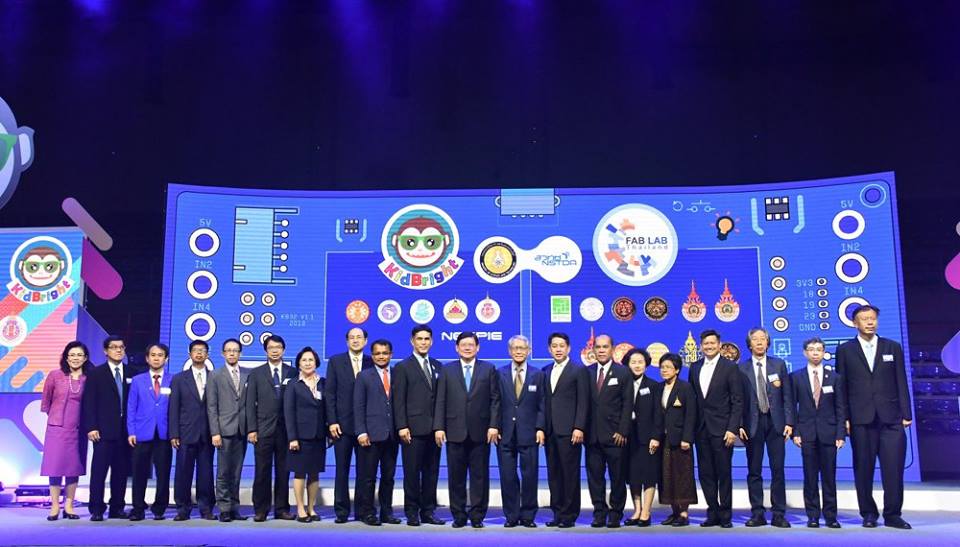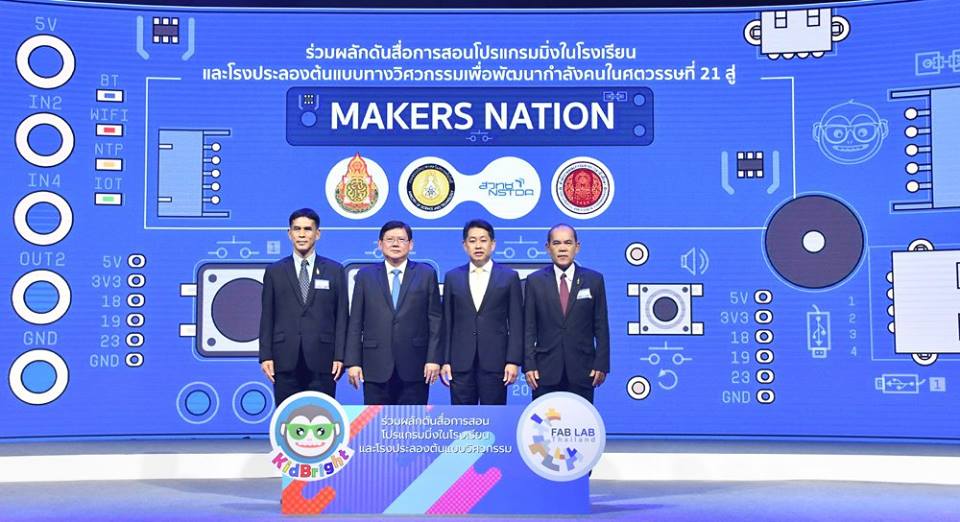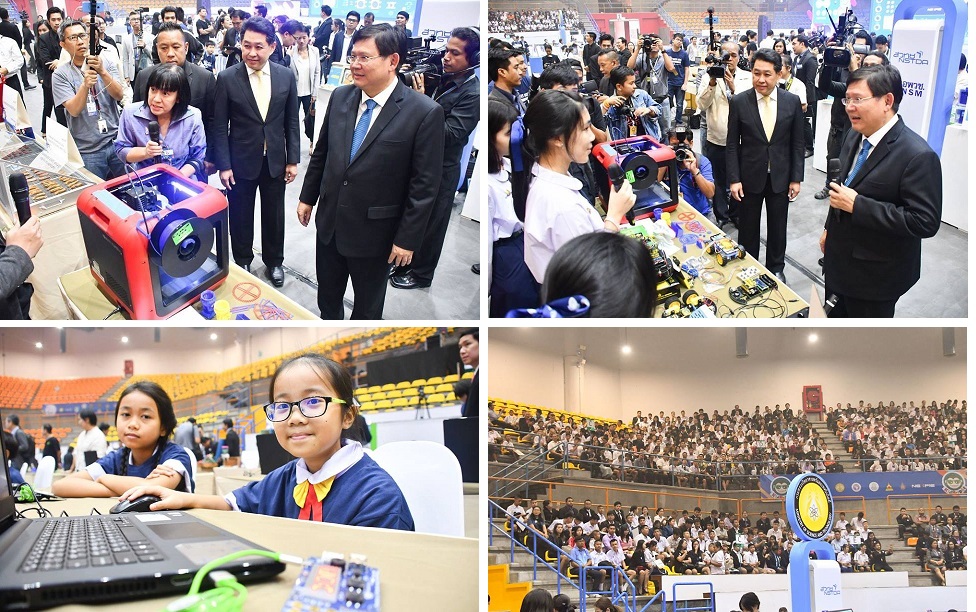8 June 2018 – Thammasat Convention, Thammasat University, Rangsit: The minister of science and technology presided the inauguration of Coding at School project. This project aims to develop innovator skills of Thai children and youth. He also visited the exhibition displaying creative works of students from different schools through
embedded system board KidBright as well as equipment examples from Fabrication Lab project in order to enhance skills on innovation of Thai children and youth towards Makers Nation according to Thailand 4.0 policy. Dr. Narong Sirilertworakul, director of National Science and Technology Development Agency (NSTDA) and the executives of NSTDA were there to welcome him.

Dr. Suvit Maesincee, minister of science and technology, stated that the ministry pursues the government policy to stress importance in conducting economic structure reform driving to “Thailand 4.0” that puts emphasis on value-based economy and innovation-driven economy. Preparing manpower to 21st century driving to Thailand 4.0 will reduce social inequality and increase Thailand’s competitiveness. In the same time, the government encourages Thais to think scientifically or foster scientific culture using science, technology and innovation (STI). An indispensable factor to build this mechanism is provided in human resource development that needs support and cooperation from public and private sectors as well as educational and family institutions. The objective is to provide Thai youth with skills, knowledge and competence and the capacity to keep up with the current world, especially the development of STEM (Science, Technology, Engineering and Mathematics) skills with a view to meet the market’s and the investors’ needs, and pursue economic development of the country with STI in fast-growing digital society.

To make human resource development successful, Ministry of science and technology therefore conducts a project to support and build economic strength in the country or Big Rock Project. This ambitious project will bring advantage to the society following “science makes human” idea. The ministry also appoints National Science and Technology Development Agency (NSTDA) the responsibility of those projects including Coding at School Powered by KidBright project and Fabrication laboratory project to develop innovation skills for Thai youth following the policy of the Prime Minister, H.E. Gen Prayut Chan-o-cha which support education and learning by undertaking substantial reform on education as follows: 1/ emphasizing on the importance of formal education and alternative education, 2/ providing support of learning and self-development to Thai youth in relation to their potential, 3/ developing and promoting the utilization of science, technology, research and development and innovation, 4/ developing individual to entrepreneurship in technology by promoting innovation on design and engineer. The policy follows Thailand-20-year national strategy that establishes the objective to develop and promote individual potential with the emphasis on the development of analytic and creative thinking, working skills and preparation for professional life. This will impact on the country’s economy and society, and as a result, drive Thailand 4.0 to become science society and build sustainable economic stability and prosperity.

Dr. Narong Sirilertworakul, director of National Science and Technology Development Agency (NSTDA) stated that NSTDA aims to develop skills on innovation for Thai youth under “science makes human” policy of the Ministry of Science and Technology in order to lay the foundation and foster analytic thinking process of new generation young people, ensure equity and reduce disparity of the education by making knowledge accessible for all especially in rural and disadvantage schools. The solid foundation of technology and innovation will bring about the development of the country in line with Thailand 4.0 policy. This comprises of the following projects.
1. Programming instruction media in school or “Coding at School” project with embedded AI board KidBright is under responsibility of National Electronics and Computer Technology Center (NECTEC). The goals of the project are to develop human capital capacity in computer program writing in schools, to increase Thai young people capacity towards regional and global excellence, to transmit knowledge of technology application in computer program writing to students from junior high schools especially those from rural and disadvantage schools, and to improve educational personnel expertise in STEM (Science, Technology, Engineering, Mathematics) education. Researchers from NECTEC and NSTDA has developed programming learning support board or KidBright, an embedded AI board that works with instruction set. The students can build instruction set with easy-to-use KidBright by simply drag and drop. With this method, the students rather concentrate on thinking process than program mistyping. The program therefore is an appropriate assistance tool for learning in junior high schools. NECTEC-NSTDA will build 200,000 KidBright boards and distribute them to 1,000 public schools throughout the country. This provide them the opportunity to learn and enhance skills also by organizing train-the-trainers program. Five hundred leaders will be trained to then expand the learning outcome to 1,000 schools as well as to organize a project contest promoting creativity in applying KidBright. The project expects at least 3,000 scientific projects from all regions of the country.
2. Engineering prototype contest or Fabrication Lab (Fab Lab) project in schools works towards the goal of enhancing skills on innovation to Thai youth in order to develop learning infrastructure about STEM in educational establishments including high schools, technology colleges and regional science squares. The project provides them with engineering infrastructure, digital and scientific measurement tools together with activities on creativity, engineering skills for students and teachers. They can then implement scientific, mathematic, technological knowledge learnt in class together with additional knowledge to design, test and invent. Students will be inspired and interested in engineering career in the future. Sirindhorn Science Home of NSTDA hosting the center for training teachers and students with the collaboration from 10 network universities facilitate in finding Fab Lab engineers and organizing activities for teachers and students at 150 schools and regions science squares with the goal to expand the project to all establishments in the country.
These two projects are going to increase potential capacity in computer programming, creative analysis, and innovation ability. Students who participate in the projects can take advantage of their free time. As a result, this will increase the capacity of human resources in the country to attain regional and international excellence sustainably (science makes human). Moreover, the projects will increase equity and reduce education inequality by spreading knowledge, and make it accessible to high schools students in rural and disadvantage schools in line with “no one is left behind” idea. The projects will also develop expertise of trainers through STEM Education concretely. In addition, the support in applying extensively instruction media from Thai research will strengthen electronic board manufacture and supply chain in industrial sector of the country steadily and sustainably (science strengthens).
